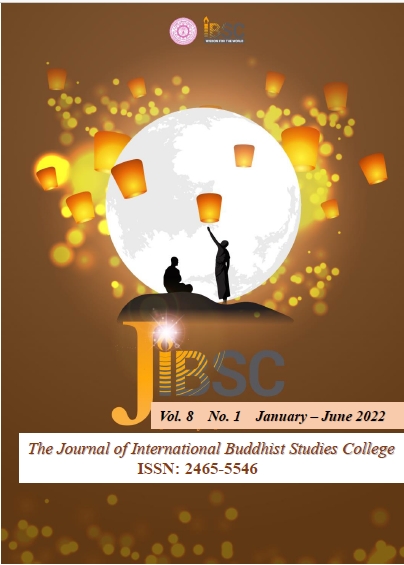Means of Abandoning Restlessness and Remorse in the Pāli Tipiṭaka
Main Article Content
Abstract
This paper explores the concept of restlessness (uddhacca) and remorse (kukkucca) from the perspective of Theravāda Buddhism, focusing on their roles as unwholesome mental factors (cetasikas) that disrupt mental clarity and spiritual progress. Within the Theravāda framework, the mind (nāma) is composed of consciousness (citta) and its associated mental factors. While consciousness itself merely knows the objects, it is the mental factors that shape one's actions—whether wholesome or unwholesome. Restlessness can manifest as both physical and mental agitation, whereas remorse is primarily a mental affliction that causes distress and impedes happiness. This paper examines these two hindrances as they are discussed in the Abhidhamma Piṭaka and other canonical texts, identifying them as hindrances (nīvaraṇa), fetters (saṃyojana), and defilements (kilesa). The study also analyzes their characteristics, functions, and the profound impact they have on an individual's mind. Finally, the paper discusses the means of temporarily abandoning these mental states through tranquility meditation and the ultimate eradication of these defilements by the attainment of noble paths and fruitions, as described in the Pāli Tipiṭaka.
Article Details
The Journal of TCI is licensed under a Creative Commons Attribution-NonCommercial-NoDerivatives 4.0 International (CC BY-NC-ND 4.0) licence unless otherwise stated. Please read our Policies page for more information on Open Access, copyright and permissions.
References
A. F, Caroline and Rhays, Davids. A Buddhist Manual of Psychological Ethics of the Fourth Century B.C., M.A. Trans. London: Royal Asiatic Society, 1900.
Bodhi, Bhikkhu. A Comprehensive Manual of Abhidhamma. Ed. Kandy: Buddhist Publication Society, 1993-2007.
Dhammananda, K. Sri. How to Live Without Fear & Worry. Malaysia: Buddhist Missionary Society, 1989.
Edward Muller. Ed. Dhammasaṅghaṇī. London: The Pāli Text Society, 1978.
Flugel, F.C. Man, Morals and Society: A Psycho-Analytical Study. London: Duckworth & Co., 1945.
Gunaratana, Henepola. A Critical Analysis of The Jhānas in Theravada Buddhist Meditation. Washington: The American University, 1980.
Janakabhivamsa, Ashin. Abhidhamma in Daily Life. Penang: Inward Path Publisher, 2004.
Janakābhivamsa, Ashin. Lay, U Ko. Abhidhamma in Daily Life. Trans. Yangon: U Ye Htay, 1999.
Johansson, Rune. The Psychology of Nirvana. London: George Allen and Unwin Ltd., 1969.
Law, Bimala Charan. Designation of Human Types (Puggala-Paññatti). Trans. Great Britain: PTS, 2006.
Major Generral D.M. Strong, C.B. The Udāna (The Solemn Utterances of the Buddha), Trans. London: Luzac &Co Publisher, 1902.
M.Leon Fee. Saṃyutta-Nikāya. r. Vol. I-IV. Ed. Oxford: The Pāli Text Society, 1970-1991.
Ñānamoli, Bhikkhu. The Path of Purification (Visuddhimagga). Kandy: Buddhist Publication Society, 1956-2010.
Nārada, Thera. The Manual of Abhidhamma (Abhidhammattha Saṅgaha of Anuruddhācariya). Yangon: Ti Ni Main Ministrative Body, 1993.
Pe, Maung Tin. The Expositor (Aṭṭhasāliṇī), M.A. Trans. London: Pāli Text Society, 1976.
R. Morris. Aṅguttara-Nikāya. Vol.I. Ed. Oxford: The Pāli Text Society, 1989.
Rhys, David, C.A.F. A Buddhist Manual of Psychological Ethics (Dhammasaṅghaṇī). Trans. Oxford: The Pāli Text Society, 1997.
Rhys, David, C.A.F. Psalms of the Brethren. Trans. London: The Pāli Text Society, 1913.
Rhys, David. and Carpenter. Dīgha-Nikāya. Vols. I-III. Ed. Oxford: The Pāli Text Society, 1982-1995
Trenckner, Victor. The Majjhima-Nikaja. Vol. 1. Oxford: The Pāli Text Society, 1993.
Thera, Nyanatiloka. Buddhist Dictionary: Manual of Buddhist Terms and Doctrines. Kandy: Buddhist Publication Society, 1952, Reprint: 1988.
Thiṭṭila, Ashin. The Book of Analysis (Vibhaṅga). Trans. London: Pāli Text Society, 1995.
Tin Mon, ehn. Buddha Abhidhamma: Ultimate Science. Malaysia: Fo Guang Shan, 2004.
Walshe, Maurice. The Long Discourses of the Buddha (Dīgha-Nikāya).Trans. Massachusetts: Wisdom Publications, Reprint, 1995.
Woodward, F. L and Hare, E. M. The Book of Gradual Sayings (Aṅguttara-Nikāya). Vols. I-V. Trans. Oxford: Pāli text Society, 2003.


